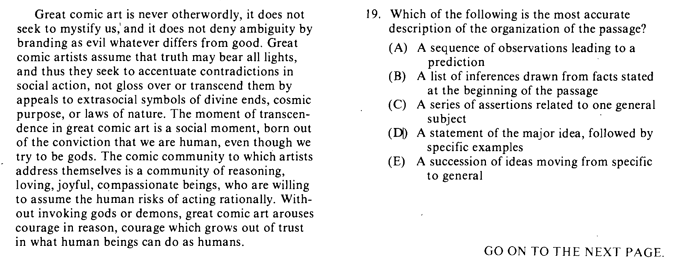Can somebody please answer this question ? Also it would be great if you can post the function for each sentence.
Thanks in advance.
Sounds like option E to me
My notes on the passage (rephrasing with function) read:
comic art isn’t this
comic art is that
description of how comic art is that
comic art is that
comic art is that
I chose C because it felt like I was being bombarded with someone’s soliloquy on comic art.
If I had unlimited time I might break down the “function” like this:
Author states opinion on what comic art isn’t
Author states opinion on what comic art is
Author states opinion of goals of comic artists
Author states opinion of comic art and social movements
Author states opinion on comic community
Author states opinion on feelings aroused by comic art
true option C is a trap, if you notice:
- series of assertions related to one general subject *
- Option A is clearly wrong, cause there is no prediction.
- Option B is wrong cause these are assertions/Ideas (Soliloquy as you are not wrong there).
- Option C is wrong cause there are 2 general subjects, as the general subject shifts from Great comic art to comic community.
- Option D is wrong cause there are no examples of Great Comic Art
- Option E to me looks the best, as initially specific instances about Great Comic art excepting mysticism and extrasocial symbols, then moves on to courage in reason and so on.
Its better if you can cross check the answer with the explanation, as I might be wrong
@solemn.kvamsi I just double checked and I believe the official answer is C. Is it the same for you in the Big Book?
I agree with you that A and B are completely out.
To me C is the best because the entire passage is the author stating his opinion over and over. The bare bones of this entire paragraph are the author’s personal assertions, one after another.
You want to recognize that ETS is putting flowery language in there to confuse you. They want you to think it has something to do with the details (community, mysticism, extrasocial symbols, courage, reason) when it really doesn’t. This is why simplifying/simplifying on steroids is helpful - because it forces you to strip the paragraph to almost nothing.
Great comic art is never X, it does not X, and it does not X. Great comic artists X, and thus they X, not X. The X in comic art is X. The comic community is a community of X. Without X, comic art does X.
X could be anything - it makes no difference to function. What matters more are the verbs: “is,” “does not,” "is, “is,” “does,” which tells you that the author is asserting his opinion.
@lexi I don’t have the big Book yet actually.
I do agree to give more credence to grammatical sense over the content cause its GRE, but I am a bit doubtful about the explanation on how to discern whether if the passage is moving from specific to general or just has a general subject (Also as I think of it, Option E doesn’t refer to any subject, its just vague)
Can I have the index to the question so that I can find it in Big Book as well?
